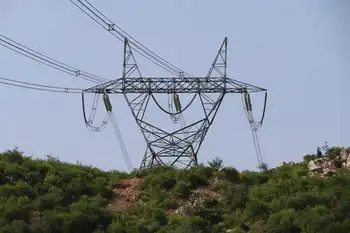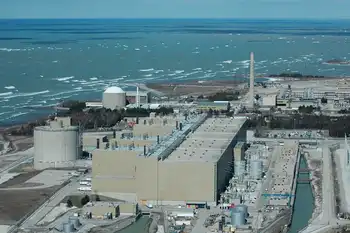Think Tanks Tackle California Energy Crisis
WASHINGTON -- - Blackouts in California have stimulated the energy of a number of think tanks around the country that are now seeking solutions to the energy crisis facing California.
They are advocating policies ranging from increased federal oversight to laissez-faire free-market approaches, and their debate is playing out against the background of the Bush Administration's efforts to stake out a workable policy that does not compromise its conservative Republican agenda.
Vice President Dick Cheney and members of a cabinet-level task force met on January 29 to discuss the task force's first step toward drafting legislation and regulations designed to enhance development of energy resources. Officials of the administration of President George W. Bush had prepared the public by filling the political talk show airwaves on Sunday, downplaying expectations for the meeting and telling interviewers that the problem is largely California's to deal with.
In contrast, many in the think tank community are eager to give California helpful advice. Two leading libertarian think tanks, the Reason Public Policy Institute of Santa Monica, California, and the Washington-based Cato Institute, have established web site resources for research on the California energy crunch. At the same time, other policy research groups from across the political spectrum are also producing both scholarship and polemics suited to California's crisis.
Much of the dispute centers on what role, if any, the federal government should play in dealing with California's energy shortages. Last week, Bush had extended an emergency order requiring out-of-state companies to supply energy to the state's power industry for two weeks; however, the White House has told reporters that the president will not grant another extension.
In keeping with that edict, prominent administration officials told weekend news audiences that dealing with the energy crunch was the primary responsibility of California's state leaders. On ABC's "This Week," Vice President Dick Cheney said the administration is "prepared to do those things that we can to help, but the basic problem in California was caused by California."
Some think tanks sharply dispute that conclusion; others accept it. Free-market think tanks vehemently argue that California's problems do not stem from deregulation. Thomas Pearson of the Washington-based Competitive Enterprise Institute describes California policy as "meddling micromanagement" by the state government. At the other end of the ideological spectrum, Joan Claybrook, President of Public Citizen, a consumer advocacy research group, says, "consumers and small businesses have been hijacked" by deregulation."
These differences between think tanks is a direct reflection of the policy debate in California, where Democratic Gov. Gray Davis, along with state legislative leaders of both parties, want to take a share of ownership in the state's two largest utilities -- Pacific Gas and Electric, and Southern California Edison. Both utilities have been close to the brink of financial collapse as deregulated wholesale electric prices have risen.
Under California's 1996 deregulation law, the power companies' ability to pass these increases along to consumers is limited, leaving the utilities without sufficient credit to buy the electricity consumers want. The deregulation law "put a noose around the utilities," says Angela Eckhardt, program director at the Cascade Policy Institute, a Portland, Oregon- based think tank with strong libertarian leanings. Eckhardt believes that the 1996 legislation allowed state regulators to set retail electricity prices for consumers.
The government, she says, forced utilities to sell off power plants and then prohibited them from obtaining competitive, long-term contracts with power generators.
The argument over "deregulation," says Eckhardt, is largely the result of media misnaming. "I think it's extremely unfortunate that so many journalists have taken politicians' word for fact," she says. "Deregulation means less government regulation, not more."
Other think tanks believe that in the light of the state's responses, deregulation has led to advantages for the utilities. For example, Gray and the leaders of the California legislature want to issue bonds to cover utility debts, and make customers pay the money back over 10 years. In exchange, California would be granted long-term options to buy low-priced stock in utilities. These think tanks say that this proposed plan amounts to a "bailout" of energy corporations.
Wenonah Hauter of Public Citizen says the idea of the power companies as victims is a myth. She says that the utilities' parent companies have spent billions buying assets in recent months. "If the power suppliers have their way, the average consumer could be paying 12 times more for electricity," says Hauter.
However, on the other side, free-market think tanks argue that too much government is already present in California's energy industry. On a web site named "The Electricity 'Crisis'?, at www.cato.org/electricity/index
http://www.cato.org/electricity/index http://www.cato.org/electricity/index , Cato scholar Jerry Taylor describes California's current situation as "managed competition." In the "Cato Handbook for Congress," published before the outburst of concern in California, Cato proposed a wide-ranging
The same note is being struck in right-of-center think tanks around the country. The week before the first White House meeting, Sen. Gordon Smith (R. Oregon), complained to the president that Oregon is "in jeopardy of becoming an energy farm to California." However, back in the Northwest, the Cascade Policy Institute's Eckhardt sounds a different theme. She admits that many Oregonians, both in and out of government, "look at the (federally-owned) Bonneville Power Administration and say, 'Look, they're selling our energy to California!' But that's not true," she says.
"BPA and California -- its all the federal government."
In this, Eckhardt echoes libertarian thinking, which regards the web of federal environmental regulations surrounding power plant construction as tantamount to federal control.
As the policy experts debate these points, lawmakers in California and surrounding states are trying to keep voters and potential voters supplied with light and heat. At the same time, think tanks are not striking a conciliatory note from either side of the political spectrum.
On the one hand, consumer advocate groups like Public Citizen angrily denounce collusion between business and government and call for increased federal oversight. A recent Public Citizen paper says a short-term solution to the crisis would be for the federal government to impose cost-based rates on out-of-state power wholesalers, who now own most of the state's fossil fuel plants.
"The federal government is the sole entity with the power to do this," says the unsigned paper. "This action would give California time to thoughtfully restructure its electric industry."
On the other hand, free-market think tanks denounce the same business-government collusion, but with vastly different policy conclusions: They think the federal government is already too involved, and want federal and state environmental standards loosened so that more power plants can be built.
For Eckhardt and other free-market-minded think tankers, the lesson of California is simple. "As far as Oregon policy goes, our legislators are still planning to move forward with partial deregulation," she says. "It would be good if everyone would look at California and learn that government meddling and bureaucratic stagnation caused this problem."
(C) 2001 UPI All Rights Reserved.
Related News

Tories 'taking the heart out of Manitoba Hydro' by promoting subsidiaries, scrapping low-cost pledges: NDP
WINNIPEG - The board of Manitoba Hydro is being reminded it can divvy up some of the utility's work to subsidiaries — which the NDP is decrying as a step toward privatization.
A sentence seemingly granting the board permission to create subsidiaries was included in the board's new terms of reference, which the NDP raised during question period Wednesday.
The document also eliminated references asking Manitoba Hydro to keep electricity rates low and supply power in an environmentally-friendly fashion.
NDP raises spectre of Manitoba Hydro's privatization with new CEO
"They're essentially taking the heart out of Manitoba Hydro," NDP leader Wab Kinew said.
Cheap,…




